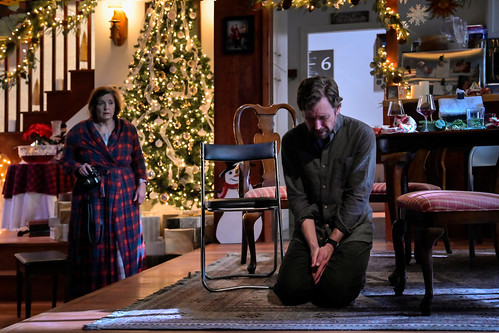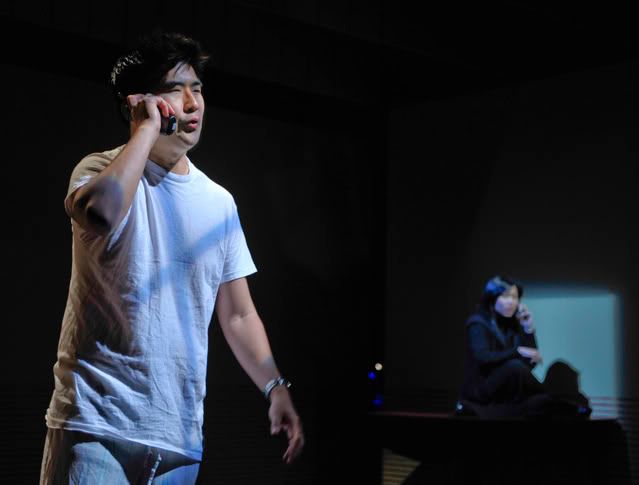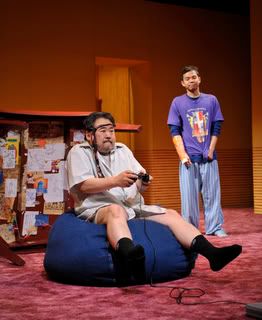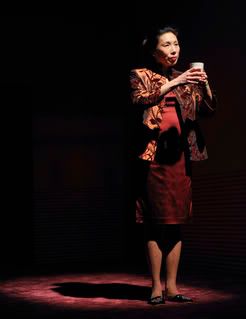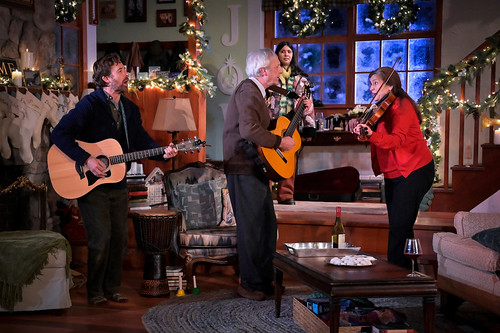
ABOVE: The cast of Leslye Headland’s Cult of Love includes (from left) Lucas Near-Verbrugghe as Mark Dahl, Dan Hiatt as William “Bill” Dahl, Vero Maynez as Loren Montgomery, and Luisa Sermol as Virginia “Ginny” Dahl. The show continues through March 3 at Berkeley Repertory Theatre. BELOW: Sermol as Ginny and Near-Verbrugghe as Mark. Photos by Kevin Berne
Can we just agree that the phrase “dysfunctional family” is redundant? Dysfunction is part of every family in one way or another, so when we say “family,” we mean a complicated set of relationships knit together with love, resentment, injury, abiding affection and mystery (among a whole smörgåsbord of other items).
Playwright Leslye Headland, probably best known for her film (Bachelorette, Sleeping with Other People) and TV (Russian Doll, the upcoming Star Wars: The Acolyte), goes right for the family jugular in Cult of Love, now at Berkeley Repertory Theatre’s Roda Theatre. This is like the frozen orange juice concentrate of family plays, and let’s just say there’s very little added water in this metaphorical pitcher.
This is the last part in Headland’s Seven Deadly Plays series, and it’s a fun sin for families: pride. At 100 intermissionless minutes, Cult of Love is equal parts dark comedy, withering drama and musical feast. With a boisterous play like this – 10 characters in a smallish Connecticut house for Christmas Eve – you know that for every big laugh (and there are many) there’s going to be something equally as painful later on (check).
Working with director Trip Cullman, Headland really piles on the issues for the Dahl family. Dad (Dan Hiatt) may be slipping into dementia, or maybe his constant stream of “I love you” and “I’m proud of you” is his way of trying to broker peace among the sibling combatants. Mom (Luisa Sermol) is heavy into denial about pretty much everything, but one family tradition she can get behind is the giant punchbowl full of Manhattans she brings out before the much delayed lamb dinner (and in the Dahl family, because tradition is everything, we pronounce the “b” in lamb because it’s…fun?).
The four grown Dahl children trudge through the snow for the one holiday when they’re all together. Of course they come bearing baggage of infinite variety. Mark (Lucas Near-Verbrugghe) left the seminary to become a government lawyer and is now at a crossroads. He no longer considers himself a Christian. His wife, Rachel (Molly Bernard), converted to Christianity to marry him and gain the acceptance of the family. She’s bitter about a lot of things, including that, but her love for her husband, troubled as he may be, is never in doubt.
Diana (Kerstin Anderson) is expecting her second child with husband James (Christopher Lowell), a minister, and while their firstborn sleeps upstairs, they express God’s disapproval of sister Evie (Virginia Kull) and her wife, Pippa (Cass Buggé). They aren’t really gay, Diana, suggests, they’re just missing God from their hearts.
It’s after 9pm, and everybody’s hungry, but mom won’t serve dinner until Johnny (Christopher Sears) arrives. He’s 10 years sober, but he still makes everyone nervous (except his mother, who doesn’t really accept that he was ever a heroin addict). When he does finally arrive, he’s accompanied by Loren (Vero Maynez), who is also in recovery and – too bad for the Dahls – is something of a shame-free truth teller.
Though the Dahls were a devoutly Christian family, the children have all traveled their own roads in and out of the church. Faith, prophecy and mental illness all get drawn into the religious discussions (and fights), where judgements, insults and intolerance (of all kinds) create a sort of hell storm set amid a cozy house over-decorated for Christmas (the set is by Arnulfo Maldonado and the lights are by Heather Gilbert).
Through it all, though, no matter how many times someone storms upstairs or stomps out of the house and says they’re not coming back, they still come back. The lure of the holiday, the promise of family as an ideal way to give and receive love, the need to reconcile past and present all create a sort of magnetic vortex that makes it almost impossible to escape, no matter how harsh and ugly things get.
And then there’s the music. Though not exactly the Von Trapps, there’s enough music here to need a music director and arranger (Jacinth Greywoode doing stellar work). The Dahls play piano, guitar, fiddle, melodica and any number of percussion instruments, and they love to sing holiday tunes, folk songs and even some more contemporary fare. The music on the piano is a volume called “The Family Songbook,” and as a family, they take music seriously – even the cranky or out-of-sorts family member can be coaxed to sing a line or two. It’s a meaningful source of connection, even amid the fracturing of relationships and the flames of explosions new and old. The music is a safe space.
Director Cullman and his cast achieve a believable level of hilarity and hatred, holiday and harassment as family members talk over, through and beyond one another. Each of us will likely identify strongly with one or another of these characters, and for me it was Rachel, Mark’s wife. She married into the Dahls but is still an outsider. She self-medicates and makes sure her wine glass is rarely empty. She’s not afraid to push back when things get spiky, and, in Bernard’s astute performance, she can be counted on for a good one-liner that’s usually something more than just a laugh.
The entire cast weaves a fascinating family web, but the play does get overwhelmed with so many issues: religion, mental illness, sexuality, addiction/recovery, childhood trauma, science denial and more religion. Pippa, the newest spouse in the family, feels the need to defend her wife but wonders, “How do you protect someone from their own family?” And later, Johnny admits that it took him years to “de-program” from his upbringing, not unlike a cult referenced in the title.
Headland eventually quiets things down enough to allow some sad, thoughtful and deep conversations to happen. Even after all the turmoil, she allows space for beauty and – if you’re feeling hopeful – love to settle in, however fleeting. It’s such a relief, though there’s no escaping the fact that even for the happiest of families (which this is most certainly not), there’s no such thing as a happy ending.
FOR MORE INFORMATION
Leslye Headland’s Cult of Love continues through March 3 at Berkeley Repertory Theatre’s Roda Theatre, 2015 Addison St., Berkeley. Running time: 100 minutes (no intermission). Tickets are $22.50-$134 (subject to change). Call 510-647-2949 or visit berkeleyrep.org.

